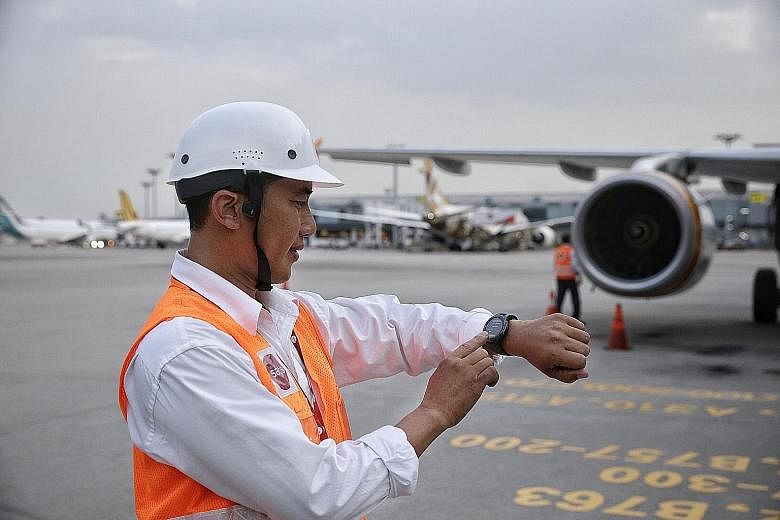Changi Airport's biggest ground handler wants tarmac staff to drop their walkie-talkies for wireless headsets that pair with smart watches.
The bone-conductor headsets allow technical ramp personnel to make and receive hands-free calls, increasing safety, said ground-handling firm Sats.
So far, about 130 staff, who guide planes to the parking gates after they land and prepare the aircraft for the next departure, have been issued the smart watches, which can receive incoming messages.
With the system, ground workers can easily communicate with both the control centre and cockpit crew instead of relying on walkie-talkies and written instructions.
Sats has about 1,000 ground workers who work on the tarmac, including loading and unloading bags.
The headset, designed in partnership with Temasek Polytechnic, allows the user to hear sounds through the bones in the jaw and cheeks to reach the inner ear.
Sats is the first in the world to deploy the use of such technology. It said productivity has been boosted by about 10 per cent because the system allows better allocation of time and resources.
"In an industry that is becoming ever more competitive, constant innovation and productivity gains are essential," said Sats president and chief executive officer Alex Hungate at a media briefing yesterday.
The initiative is the latest in a series of innovative productivity projects supported by the Civil Aviation Authority of Singapore (CAAS) Development Fund.
Separately, Sats also announced that it had been awarded accreditation by the International Air Transport Association (IATA) to train ground handlers across South-east Asia and in India.
Mr Conrad Clifford, IATA regional vice-president for the Asia-Pacific, said: "Air travel in Asia is expected to grow exponentially, but there is still a deficit in trained personnel to meet the demand. It is also crucial that ramp and apron services keep up with the most recent industry developments.
"With expertise in Asian aviation, coupled with Singapore's status as a world-class air hub, Sats is well placed to enhance ramp handling services training across the region."
The new training programme is scheduled to begin in March and expected to train about 2,000 people in two years.
Second Minister for Transport Ng Chee Meng, witnessed a demonstration of the headset system. He later said that innovation is key to prepare Changi for the future.
The use of self-service check-in kiosks at the airport for example, has cut the number of staff required by about 20 per cent.
But even as automation reduces the reliance on manpower, he said the industry's need for talent and manpower will continue to grow.
Mr Ng said that in Singapore, about 5,000 jobs, including positions for cabin crew and engineers, will be created next year.


